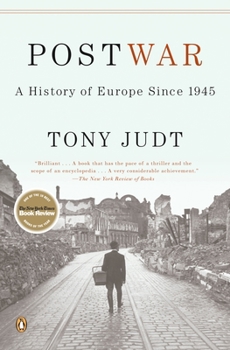Postwar: A History of Europe Since 1945
(Part of the Postwar: A History of Europe Since 1945 Series)
Select Format
Select Condition 
Book Overview
Finalist for the Pulitzer Prize - Winner of the Council on Foreign Relations Arthur Ross Book Award - One of the New York Times's 100 Best Books of the 21st Century "Impressive . . . Mr. Judt writes with enormous authority." --The Wall Street Journal "Magisterial . . . It is, without a doubt, the most comprehensive, authoritative, and yes, readable postwar history." --The Boston Globe Almost a decade in the making, this much-anticipated grand history of postwar Europe from one of the world's most esteemed historians and intellectuals is a singular achievement. Postwar is the first modern history that covers all of Europe, both east and west, drawing on research in six languages to sweep readers through thirty-four nations and sixty years of political and cultural change-all in one integrated, enthralling narrative. Both intellectually ambitious and compelling to read, thrilling in its scope and delightful in its small details, Postwar is a rare joy.
Format:Paperback
Language:English
ISBN:0143037757
ISBN13:9780143037750
Release Date:September 2006
Publisher:Penguin Books
Length:960 Pages
Weight:2.16 lbs.
Dimensions:1.7" x 6.1" x 9.2"
Age Range:18 years and up
Grade Range:Postsecondary and higher
Customer Reviews
3 ratings
Remembering and Forgetting
Published by Thriftbooks.com User , 19 years ago
The two adjectives that come to mind after reading this work are magisterial and comprehensive. Although I am no expert on the subject, this is probably the most definitive history of postwar Europe to date. Historian Tony Judt (one of my favorite reviewers for the "New York Review of Books") was born in London, educated in Paris, and is currently director of the Remarque Institute in New York, an institution dedicated to the better understanding of Europe in America. In this work, Judt takes us through 60 years of European history, from the wasteland of 1945 to the peaceful and affluent Europe of 2005. After the self-destructive mayhem of the early 20th century, Judt shows how lessons were learned and institutions designed so that the horrors would never be repeated. He speculates that the European model may yet be the model for other nations or groups of nations to emulate in the 21st century. As Judt rightly points out in his essay on European memory, Europe was able to rebuild economically and politically by forgetting about the immediate past. There was much to forget. It was shameful how many people collaborated with the Nazis and how few resisted. He claims that it took only 1,500 Nazi officials and 6,000 German policemen to control France, a nation of 40 million. The Netherlands was not much better. After the war, it would have been even more destructive to seek retribution, even though there was some settling of scores. The Allies, as well as the Soviets on their side, used former members of the Nazi party to administer the occupied countries, since most of the talented people were part of the Nazi regime. In the immediate aftermath of the war, the period from 1945 to 1949, there was a sense of hopelessness, and it even looked like Europe was doomed as a civilization. Ironically, it was the beginning of the Cold War that saved Europe. Western European countries were forced to cooperate with each other on a scale not seen before. France and Britain originally wanted reparations from Germany, not only because they felt entitled, but they wanted to keep Germany weak. However, in the face of the gathering Soviet threat, they decided to make West Germany a integral part of Western Europe. In addition, US funding of the Marshall plan and the creation of Nato allowed Western Europeans to work furiously to rebuild their economies. During this period, they had an economic growth rate that within 10 years made them wealthier than they were before the war. Nato was designed to be a defensive organization. After the uprisings in Germany in 1953 and Hungary in 1956, it became clear to the Europeans that the US was not going to intervene in Eastern Europe. This actually created further stability in the West. Judt is very good at showing how the Common Market got started and how it became the European Union of today. It was a response to the utter destruction of World War II, and it was also a response to the threat of the Sovie
Excellent survey
Published by Thriftbooks.com User , 19 years ago
This is an excellent survey book for the general reader that pulls together the disparate developments in European history since the end of WWII. The result is a cohesive overview I have not found elsewhere, especially consideration of the turmoil in the Eastern bloc and the practical political problems. I disagree with several criticisms levelled at the book in the following particulars. First, it is claimed that the book offers nothing new. That is true in the sense that what is reported it not new; however such an excellent overview is new. Second, there are complaints about the lack of footnotes. On this I again say the book is an overview and not directed at specialists. Inclusion of anything approaching an academically adequate footnoting would have expanded the work to two or more volumes. Third, it is claimed there are errors. Well, sure there are. Judt is writing about developments in 40+ nations which ranged from advanced to backward. However, given the volume of factual matter, there appear to be few errors. Fourth, it is claimed that the book is too long. I disagree and believe that Judt did an excellent of job of editing down to get the book to the size it is. A reader who is not interested in some parts can skip them. This is not a work for specialists who will likely criticize it as a popularization as they proceed to write their dry tomes no one but other specialists will ever read. I grew up in the forties and fifties and spent most of 1961 to 1965 in West Germany in the military and as a foreigh exchange student. It was a delight to read Judt's research about those years and those that followed. Great Book!
The definitive account of Postwar Europe
Published by Thriftbooks.com User , 19 years ago
The three main themes of this account of postwar Europe is the death of ideology, the role individuals in shaping history, and the birth of the European Union and a new way of life that rejects the extremes of Soviet Communism and American Capitalism. Tony Judt makes the case that the era of political ideologies was ending in the last half of the twentieth century. In Western Europe the birth of the welfare state and the combining of the left and right on various issues resulted in the end of the political extremism. While in Eastern Europe, Communism was unable to reform itself as seen in the failed uprisings in Hungary and Czechosolvakia ending in its final collaspse in the period from 1989 to 1991. Moreover the repression of the Communist regimes combined with their economic mismanagement soiled the reputation of Communism in both Eastern and Western Europe. Despite these faults, Judt mantains that it was Gorbachev and his reforms which resulted in the fall of Communism. Judt's view of Gorbachev supports his thesis about the role of individuals in shaping history. Judt writes that Stalin in implementing harsh Communist governments throughout Eastern Europe discouraged Western European nations from pursuing a neutral course during the start of the Cold War. While Juan Carlos in Spain was able to transform Spain from being an authoritrain country into a democracy. Finally Milosevic and not any organized nationalist ideology helped to enflame the Serbs into committing war crimes in Bosnia during the nineties. The third theme of this book is the growth of the European Union that started as customs union for agricultural goods and then unifed its monetary policy in the seventies which resulted in a common currency in 1999. Tony concludes his book by stating that the European Union now promotes a new way of life that secures a free first class education and healthcare for its citizens and has strong safety net for the unemployed and elderly. The only weakness of this book is that Judt ignores other areas of European partnership such as Airbus and the European Space Agency, and he doesn't spend enough time in writing about the Muslim populations in Western Europe and their problems with assimilating into a secular society.
Postwar: A History of Europe since 1945 Mentions in Our Blog

29 Beach-Perfect Doorstoppers
Published by Ashly Moore Sheldon • August 04, 2024
With your toes in the sand, the sun on your face, and the roar of the surf drowning out your worries, reading at the beach is a double dose of escape. But what makes the perfect beach read? Depends on the reader. If you're looking for a really big book to get lost in, here are 29 beach-perfect doorstoppers for you.

The 100 Best Books of the Century?
Published by Ashly Moore Sheldon • July 28, 2024
A few weeks ago, The New York Times Book Review published a piece entitled The 100 Best Books of the 21st Century and it has garnered lots of attention. Here's a look at the list, along with highlights, a reading guide, and more.





